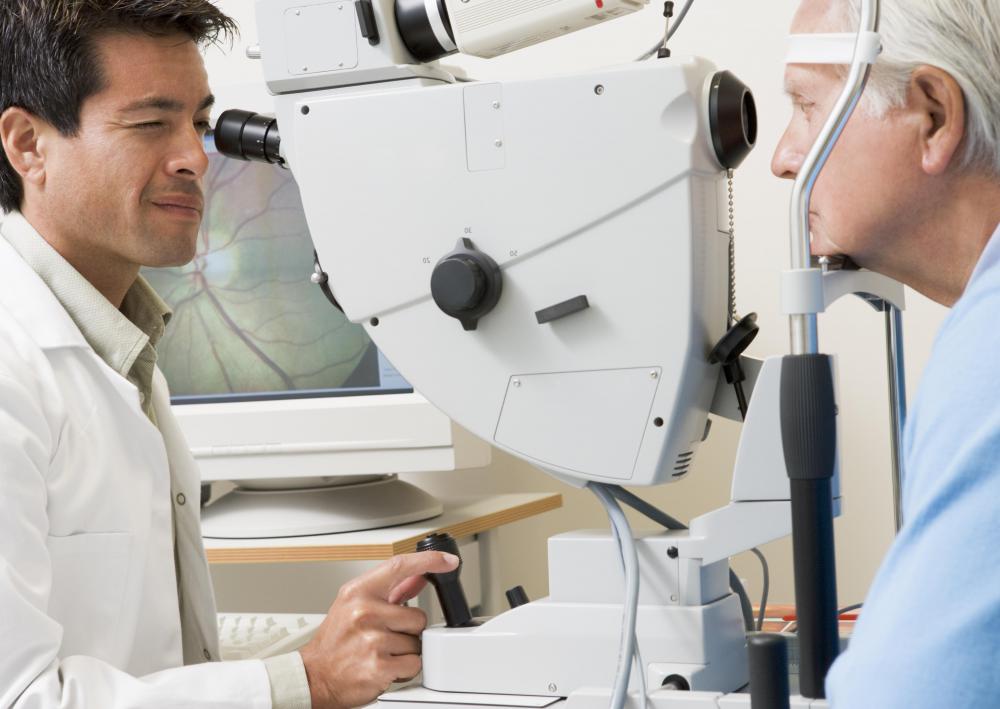At TheHealthBoard, we're committed to delivering accurate, trustworthy information. Our expert-authored content is rigorously fact-checked and sourced from credible authorities. Discover how we uphold the highest standards in providing you with reliable knowledge.
What is Enophthalmos?
Enophthalmos is the progressive displacement or sinking in of either one of both eyeballs over any length of time. Sometimes the sinking process occurs over the course of several years and other times it can happen in only a matter of minutes. It is considered to be a frequent medical issue and is prominent in the United States and globally at the same rate of occurrence. Although the main issue with enophtalmos is deformity, especially if the eyeball sinks more than 2 mm (.08 in), there are rare occasions when the patient dies. The condition can affect a person at any age.
If both eyeballs are affected with enophtalmos, it may be difficult for a doctor to diagnose the condition, unless old photos or x-rays had been taken before the condition occurred. Alternatively, if one eyeball is affected, simply comparing the two eyes make diagnosis much easier. Regardless, a specialist should be consulted if there are any concerns with the eyes.

There are several causes of enophthalmos. For example, sometimes the orbital cavity does not develop properly after birth. In those cases, the bone or tissue stops growing. In other cases, the orbital cavity expands or there is a volumetric decrease of the orbital contents. Many of these causes are the result of surgery or other secondary conditions. Occasionally, the problem could originate while the person is developing in the womb, as well.

Enophthalmos can be treated medically, in many cases. The medical treatments depend on what has caused the condition. For example, if metastatic disease is responsible, then chemotherapy may be suggested. Once the disease is under control, there are non-surgical options for the patient. For those who need to undergo surgery, doctors may try to repair an orbital fracture or replace any volumetric loss in the orbital area. Before undergoing surgery, it is best to consult an oculo-plastic surgeon or a neuro-ophthalmologist.

There may be complications if the patient has been suffering from enophthalmos for an extended period of time. In some cases, there may be severe orbital trauma associated with the condition. Such trauma can cause scarring and make surgery difficult; however, in most cases, the condition is treatable and the prognosis is excellent.
People who suffer from enophthalmos must be instructed not to sneeze with an open mouth or to blow their nose. Such mundane activities can cause an orbital fracture or even blindness in someone affected by enophthalmos. Activities must also be monitored to prevent trauma to the orbital region.
AS FEATURED ON:
AS FEATURED ON:
















Discussion Comments
I was 15 years old when my family noticed that my right eye was smaller than my left eye. I went to the doctor, and the doctor said that it was just an infection. He gave me eye drops to cure it but nothing happened. Now that i read this, I'm afraid that something bad might happen to me. I'll be going to an eye specialist to cure this.
I'm now 16 years old and I hope my eyes are okay by the time I'm 18 years old. May God bless us.
My cousin was 32 when he found out he had enophtalmos. He had been complaining to his wife about his watery eyes for ten years, but he just assumed he was allergic to her cats.
As time went on, the watering began to affect his vision. His eyes kept blurring over, and it was hard to see through the tears. He started to have a yellow discharge that seemed unusual.
When he visited his eye doctor, she noticed that his right eye appeared to be sunken into his head further than his left. She decided that his best option would be for her to add volume to the area with fillers.
I cannot imagine being unable to blow my nose! I have to blow mine dozens of times a day just to be able to breathe. If a person with this condition also had severe allergies, they would be in serious trouble!
Also, if you really have to sneeze, you're not thinking about whether or not your mouth is open. If I had this condition, I would walk around anxious all the time, afraid that I would do something unintentionally that would result in blindness!
Post your comments